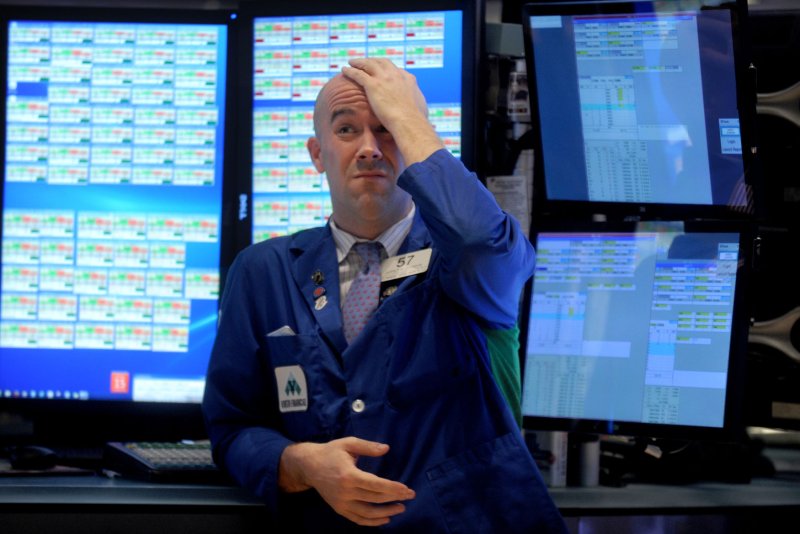U.S. markets fell Monday after a decline in the Chinese yuan and warnings of a recession. File Photo by Dennis Van Tine/UPI |
License Photo
Aug. 5 (UPI) -- The U.S. Treasury designated China a currency manipulator Monday evening after all three major U.S. stock indexes plummeted amid a trade dispute with Beijing.
The Dow Jones Industrial Average sank more than 767 points for a 2.9 percent drop at closing, while the S&P 500 shed 82 points (2.82 percent drop) and the Nasdaq fell more than 278 points (3.47 percent drop).
The U.S. losses also followed a Monday statement from China's central bank that it's confident it can stabilize the value of the yuan after a substantial decline in value against the U.S. dollar. The bank attributed the decline to "unilateral and protectionist measures" and the added tariffs.
President Donald Trump accused China of allowing the value of the yuan to drop against the U.S. dollar so that U.S. products are more expensive for consumers in China. The yuan fell below its usual 7-to-1 ratio with the U.S. dollar for the first time in a decade.
"China dropped the price of their currency to an almost a historic low. It's called 'currency manipulation.' Are you listening Federal Reserve? This is a major violation which will greatly weaken China over time!" Trump tweeted.
Later Monday, the U.S. Treasury designated China a currency manipulator, ratcheting up a trade war between the two countries.
"In recent days, China has taken concrete steps to devalue its currency, while maintaining substantial foreign exchange reserves despite active use of such tools in the past," the Treasury Department said.
The market losses followed a warning from brokerage house Morgan Stanley to investors that a global recession could arrive if Trump moves forward with new plans to tax China and fails to resolve the trade dispute that's been going on for more than a year.
The Wall Street firm said in a note to investors the plan for new tariffs on $300 billion worth of Chinese goods, which Trump announced last week, could trigger the recession in nine months. Trump vowed to impose a 10 percent tax starting next month.
"While we don't know the exact tipping point, we are cognizant of the risk of a potential non-linear tightening in financial conditions and its impact on [capital expenditure] and the labor market," Morgan Stanley analysts wrote in its note to clients.
Morgan Stanley Chief Economist Chetan Ahya said continually taxing Chinese products skews their prices to the downside.
"About two-thirds of goods tariffed in this round are consumer goods, which could lead to a more pronounced impact on the U.S. as compared to earlier tranches," Ahya wrote. "Trade tensions have pushed corporate confidence and global growth to multi-year lows."
Economists at Bank of America Merrill Lynch also warned of the potential consequences of the administration's use of tariffs.
U.S. and Chinese negotiators showed some progress in Shanghai last week, but Beijing reacted strongly when Trump announced the new tariffs a day later.















